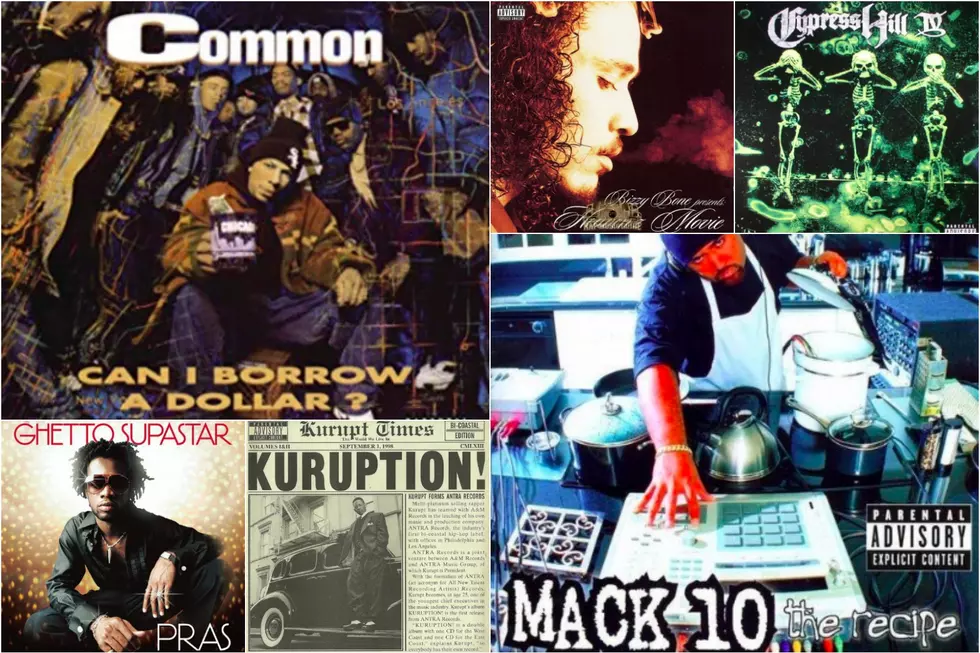
20 Years Later: Mack 10’s Self-Titled Debut Album Slaughters the Competition
1995 was a very exciting time for West Coast hip-hop. What had started with the success of N.W.A had blossomed into a full-blown renaissance that was impossible to ignore.
During the previous six years, a number of acts would join N.W.A in putting the West on the map, including Compton's Most Wanted, Above the Law, Spice-1, King Tee and other Cali stalwarts that released some of the best albums of all-time. Many new groups and solo artists would crash the party and strengthen the West's grip on the rap world, but the most successful upstarts of the era would be proteges of N.W.A principals Eazy-E, Ice Cube and Dr. Dre, all of whom would assist in breaking new talent that would place their stamp on the genre with classic albums and memorable hit songs.
One of these artists is Mack 10, a no-frills lyricist out of Inglewood, Calif. The rapper would prove to be one of the more successful artists in the lineage of L.A. hip-hop. After getting his feet wet and plying his trade on the local scene, Mack 10 met DJ Bobcat, who had gained notoriety from his work with rap royalty such as LL Cool J and Ice Cube. The producer originally intended to enlist Mack as a member of his rap collective, the L.A. Posse, but would ultimately link up with Ice Cube and DJ Pooh, who also played a big role in Mack's rise to stardom.
Following his introduction on Cube's 1994 release, "What Can I Do (Remix)," Mack 10 inked a deal with Priority Records and released his eponymous debut album on June 20, 1995. The Mack 10 LP was largely produced by Ice Cube and DJ Crazy Toones, but also featured beats from Madness 4 Real, 88 X Unit and Dr. Jam, most of which are sonically enticing and add to the album rather than hinder it. Features are limited with Mack handling most of the heavy lifting on his own. The album's only guest appearances come from K-Dee and Mack's Westside Connection cronies Ice Cube and WC. While Mack 10 goes for self lyrically on his debut, thematically, the album's catalyst is Ice Cube, who plays as a narrator along for the ride in a day of his protege's eventful life.
Listen to Mack 10's "Westside Slaughterhouse" Video Feat. Ice Cube & WC
Mack 10 opens with the hilarious opening skit, "Mickey D's Lick," which finds the rapper busy committing a robbery while at the drive-thru window of his local McDonald's -- large fries, Happy Meal and all. The unfortunate cashier, who happens to be Ice Cube, turns heel and joins forces with Mack 10 on his crime spree, marking the beginning of their partnership.
The album officially kicks off with "Foe Life," which was produced by Ice Cube and was the first single released from the LP. "Mack 10, nutty as they come, leave 'em face down / And numb from the waist down," the rapper aggressively barks, setting the tone for the album and making it clear that while his mentor may have been more concerned with social commentary than tales of thuggery, he's down to get busy, even if it involves a homicide at a drop of a dime.
"Foe Life" may be the most recognizable song on Mack 10 and considered a West Coast classic, but the album has much more to offer. Take "Wanted Dead" for example, which features the MC on the run from the law and flowing over a thumping soundbed concocted by Ice Cube, which is a testament to his underrated prowess behind the boards.
L.A. is known as much for its car culture as well as its palm trees and sunny weather, so it's no surprise that Mack 10 would include a ditty dedicated to riding clean on his album, which he serves up with "On Them Thangs," which speaks to his love of Daytons and more. "Old Chevy's to Cadillacs on twisters and dubs / Everybody got a plaque given pub to they car club," he delivers. Produced by 88 X Unit, the beat features an easily recognizable sample of Rick James' "Mary Jane," but beefed up with additional drums and guitar riffs, which saves it from being a complete jack.
Watch Mack 10's "On Them Thangs" Video
"Chicken Hawk" catches Mack 10 in some devious activity and on the hunt for an unsuspecting mark, while "Here Comes the G" is a smoothed-out affair that is pleasing to the ear. The rapper puts down his gun to get his groove on. The main event on Mack 10 is the punishing posse cut, "Westside Slaughterhouse," which marks the debut of what would come to be known as the Westside Connection and contains a few blatant jabs at Common in response to his 1994 single, "I Used to Love H.E.R."
At the time, the West took umbrage with Common's song due to what was assumed to be thinly veiled shots at West Coast hip-hop. "When you see H.E.R., she's a goner, moved to California / Blew the bitch up and put the gangsta twist on her," Mack 10 raps on On "Westside Slaughterhouse" in a display of loyalty to the home team. Ice Cube also sends darts in Common's direction with the lines, "All you suckas wanna diss the Pacific / But you busters n----- never get specific / Used to love her mad cause we f---ed her / P---- whipped bitch with no Common Sense / Hip-hop started in the West / Ice Cube bailing through the East without a vest." He certainly made no secret who the target is.
The track would garner a response track from Common, titled "The Bitch in You," which is regarded as one of the most scathing diss tracks of all-time. The conflict between all parties was eventually squashed during a meeting with Minister Louis Farrakhan, but remains a memorable moment in rap history.
Mack 10 rolls along with the rollicking number, "Armed and Dangerous." The rhymer channels the energy of vintage Ice Cube with a thunderous verse. "H.O.E.K." features an appearance from K-Dee, a former group mate of Ice Cube during his C.I.A. days, and wins with its cold-chilling soundscape along with K-Dee's impressive lyrical performance. Another head-bop-inducing cut is "10 Million Ways" a self-produced tune that's equally nihilistic and infectious.
Philandering Mack 10 is present on "Mozi-Wozi," which borrows heavily from Earth, Wind & Fire's "Devotion" and gives props to the motels that accommodate all the jump-offs and players, domestically and internationally. Mack 10 ends on a strong note with the high-octane selection "Mack 10's the Name," and serves as a reminder of his moniker to those unfamiliar with his work in the booth or the street.
Mack 10's self-titled debut may not have caused much commotion as far as garnering platinum plaques or smash singles, but historically, the album stands as a noteworthy gem and a West Coast classic. Initially, the album received mixed reviews, with All Music critic Stephen Thomas Erlewine writing, "Mack 10 doesn't come across as an original on his self-titled debut, he comes across as a follower" before going on to classify the album as a "multitude of cliche'd gangsta lyrics" and concluding that Mack 10 lacks the personality to make his music interesting.
But time has shown that Elerwine and other critics who panned the album were off base in their assessments, as it is hailed in the City of Angels and beyond as one of the finer albums from its era. It set the foundation for the Westside Connection as well as for goading Common into participating in one of the more musically impactful beefs of the mid '90s, both of which are now being discussed and celebrated two decades later.
The project is packed with dope lyrics and strong production, plus there are few blemishes or sore spots included. Mack 10 may get less attention than it merits as an LP, but it's an oldie-but-goodie that gets The Boombox nod of approval as a solid body of work.
See 50 Inspirational Quotes From Your Favorite Rappers
More From TheBoombox








